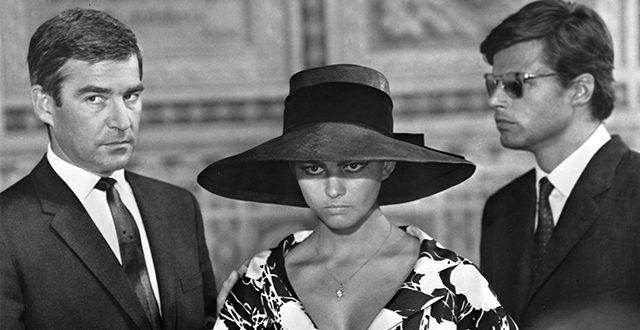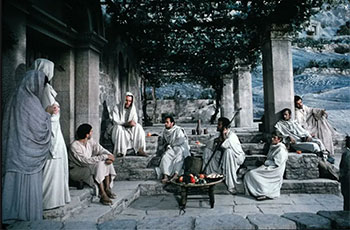
COMMEMORATING 30 YEARS OF TFF
08/26/2020Luchino Visconti was and is best known for his epics. The Film Foundation has facilitated four Visconti restorations. Senso, Rocco and His Brothers and The Leopard, restored by the Cineteca di Bologna, unfold on grand historical canvases—Senso and The Leopard at the time of the Risorgimento and Rocco during Italy’s mid-century economic boom. Vaghe stella dell’Orsa, known here as Sandra and restored by Grover Crisp and his team at Sony/Columbia, is unlike any other Visconti film, or any other film for that matter. The action is largely confined to intrigues and conflagrations between six principle characters in a decaying villa in the ancient Tuscan town of Volterra, whose history dates back to the pre-Roman Etruscan civilization. The narrative is inspired by the story of Electra and her brother Orestes, who plotted and carried out the murder of their mother Clytemnestra to avenge her murder of their father. In Vaghe stella dell’Orsa, the Electra and Orestes figures played by Claudia Cardinale and Jean Sorel are returning to their home for the unveiling of a statue dedicated to their father, who was killed in Auschwitz. They both suspect their gentile mother (Marie Bell), now confined to a mental clinic, of having betrayed their father to the Nazis, and her second husband (Renzo Ricci) of aiding and abetting her. Their mother and stepfather in turn accuse Sandra and Gianni of an incestuous relationship— in her mad ravings their mother attributes it to their “Jewish blood.” For Sandra and her deeply disturbed brother, their secret codes and meetings and ingrown physical intimacy are the outward manifestation of a blood pact that protects them from a hostile universe. Sandra’s British husband (Michael Craig) can only observe the endless internecine war of attrition with amazement and growing sadness. If I’m taking pains to lie out the dramatic and thematic particulars, it’s because they’re so densely layered and yet achingly present and felt. For most of the great European directors of the era and for Visconti in particular, politics and aesthetics and psychology and history all flowed together in the same river. Visconti the dramatist knew how to isolate each of these forces while Visconti the director knew how to incarnate and intensify and them within the flow. You can see links between Vaghe stella dell’Orsa and Through a Glass Darkly, but Bergman is zeroed in on questions of madness and the supernatural. You can see links with Muriel and La Guerre est finie, but in Resnais’ films every emotion is tightly held beneath the surface. “It’s along the same lines as those thrillers in which everything appears very clear at the beginning and very obscure by the end,” said Visconti of his film, “as always happens when people attempt the difficult task of understanding their own reactions, feeling absolutely sure they have nothing to learn but ending up face to face with agonizing existential problems.” This kind of lucid understanding of complex issues is largely missing from the cinema now, and that’s a real pity. On cursory examination from the depressingly common contemporary standpoint mandating that everything be boiled down to one adjective or category, Vaghe stella dell’Orsa would appear to be hopelessly “dark,” no matter how “sexy.” As if anything less than an easily comprehensible affirmation were a threat to our security. All I can say is that I find this film a deeply unsettling experience—thrillingly so. That’s why, a few years back, I found myself going back to see it and re-see it four nights in a row.
- Kent Jones
Follow us on Facebook, Instagram, and Twitter!
SENSO (1954, d. Luchino Visconti)
Restored by StudioCanal, Centro Sperimentale di Cinematografia-Cineteca Nazionale, and Cineteca di Bologna at L’Immagine Ritrovata. Restoration funding provided by Gucci, The Film Foundation, and Comitato Italia 150.
ROCCO AND HIS BROTHERS (1960, d. Luchino Visconti)
Restored by Cineteca di Bologna at L’Immagine Ritrovata laboratory in association with Titanus, TF1 Droits Audiovisuels and The Film Foundation. Restoration funding provided by Gucci and The Film Foundation.
THE LEOPARD (1963, d. Luchino Visconti)
Restored in association with Cineteca di Bologna at L’Immagine Ritrovata, Pathé, Fondation Jérôme Seydoux-Pathé, Twentieth Century Fox, and Centro Sperimentale di Cinematografia-Cineteca Nazionale. Restoration funding provided by Gucci and The Film Foundation.
SANDRA (1965, d. Luchino Visconti)
Restoration by Sony Pictures Entertainment in collaboration with Cineteca di Bologna at L'Immagine Ritrovata, Archivio Storico delle Arti Contemporanee di Venezia and The Film Foundation.
